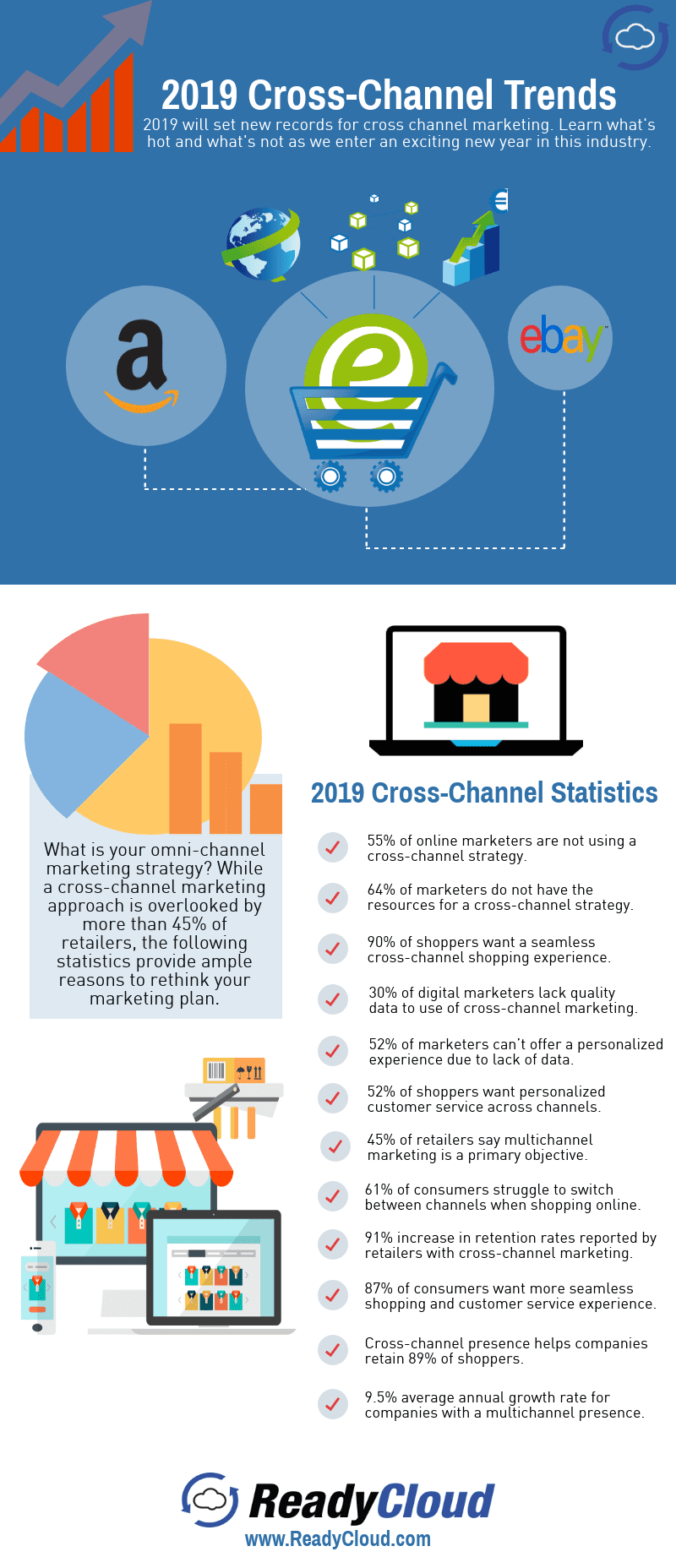These Cross-Channel Ecommerce Statistics Prove It’s The New Normal

Today, ecommerce exists is a multi-channel world.
Just a few years ago, sellers relied primarily on their websites to move products. Today, though, the average seller is using many marketplaces, (these might include Amazon, Jet, eBay, Etsy, and Rakuten) as well as their website to get more sales.
While this may seem like a lot of work, cross-channel ecommerce presents a massive opportunity for modern retailers. By allowing you to position your products as many places as you can, multichannel ecommerce is making online stores more competitive and agile than ever before.
Here’s what you need to know about this very disruptive, yet very welcome shift with these ecommerce shift in our 2019 followup on cross channel statistics that will shape the industry.
What is Cross-Channel Commerce?
Here’s how BigCommerce defines it:
“Multi-channel retailing is an ecommerce selling strategy that targets customers on various channels beyond a company’s website. Multichannel retailing has evolved beyond promotion to include multichannel selling directly to consumers on social media, marketplaces, and other mediums.”
Omnichannel Ecommerce Statistics You Need to Know
What’s so crucial about cross-channel ecommerce? What can multichannel ecommerce do for you? Here are ten facts everyone interested in multichannel ecommerce should know:
- 66% of online shoppers rely on more than one channel for purchases. We reported this in our post, “2017 Cross-Channel Selling Statistics you Need to Know.” Today, about one-third of all customers rotate between channels to make purchases, which is something retailers must pay attention to.
- The average customer visits a site 9.5 times before they convert. These shoppers are busy comparing prices and checking on things like shipping prices and return policies.
- Customers who cross-shop are worth 30% more in lifetime value. Compared to single channel shoppers, these customers shop more and spend more.
- Only 5% of marketers are equipped to market across channels. This means that stepping into multichannel ecommerce now puts you in a good position to outpace your competition.
- Amazon owns more than 26% of the market share. This popularity owes largely to competitive prices, cheap shipping, and easy returns – all of which are offered by the platform.
- 90% of customers want a cross-channel shopping experience. If higher sales weren’t enough to convince you to jump into omnichannel ecommerce, customer preference should
- When retailers implement cross-channel marketing plans, customer retention increases by 91%. While there are many reasons for this, the largest is the fact that customers want cross-channel ecommerce, and they’re willing to stick with the brands that offer it.
- Companies that pursue a multichannel presence enjoy a 9.5% average growth rate. This is much higher than the average annual growth rate of companies that don’t pursue multi channel opportunities.
- Retail ecommerce sales are expected to reach $2.5 trillion by the end of 2018. This is compared to $1.1 trillion in 2013.
- 60% of shoppers begin product research on a mobile device. Right now, 2 billion people use their smartphones for at least an hour or two per day. This is a major market you don’t want to miss tapping into.
4 Ways to Improve Your Cross-Channel Selling
If you’re already conducting multi-channel marketing, there are ways to improve your approach. If you’re not yet participating in omnichannel ecommerce, these tips can help you get started on the right foot:
1. Add a CRM to the Mix
Right now, Shopify is one of the most popular shopping cart services for multichannel marketers who want a user-friendly interface and all the functionality they can handle. Used by more than 200,000 businesses around the world, Shopify has quickly become a mainstay and studies find that more Shopify sellers are adding cross-channel ecommerce CRMs. But why?
There are many reasons for this. Not only is Shopify consistently making improvements to their offerings, but they provide easy access to free and premium plugins and easy-to-use store themes, including CRM solutions. As if all that weren’t enough, they also make it easy for retailers getting into cross-channel ecommerce to provide better service and a more streamlined shopping experience to their customers. Of the 77% of Amazon sellers that are using multichannel ecommerce, a whopping 35% use Shopify to power their storefront.
Why More Shopify Sellers are Using CRM:
- Cross channel CRM gives Shopify retailers a real look at their ecommerce numbers.
- Detailed reporting helps the retailer better identify trends and learn the seasonality of their shoppers.
- Included marketing features help Shopify retailers tailor newsletters to improve conversion rates while avoiding remarketing to serial returners.
- Built-in calendars and to-dos help the retailer stay on top of their business tasks.
- Instant customer profiles with order, shipping and returns timelines take customer service to the next level.
- Built-in premium plugins for shipping and returns convert CRM into an all-in-one ecommerce solution.
As you can see, adding a CRM like ReadyCloud to your ecommerce activities is a great way to boost your ROI and increase your bottom line.
2. Offer a Memorable Customer Journey
No matter how you sell your product, you’re always doing one thing: offering an experience to your customers. Because of this, making that journey memorable and cohesive is one of the most important aspects of succeeding in multichannel commerce.
According to Inc. Magazine, leading companies invest in the customer experience, and they grow 14% faster than their competitors. With this in mind, use software and intelligent marketing tactics to keep your customer journey fun, simple, and memorable. If you’re not as good as, or better than, your competition, you’ll be left behind.
3. Streamline Product Returns
The vast majority of customers use a few channels to conduct their shopping, and they expect each to offer a streamlined, simple, and inexpensive return process. Today, customer returns have a large correlation on the loyalty rankings of your clients, and can go a long way toward influencing if and how long customers stay with your company.
While using a good CRM software will simplify the returns process, it’s also important to take steps like providing free returns, writing a bulletproof return policy, and increasing the size of your returns window to make the process as easy as possible for customers.
4. Target and Personalize Your Content
While targeted content is essential in all aspects of modern marketing, it’s especially important in the world of omnichannel ecommerce. If you’re going to use various touchpoints to facilitate a buyer experience, personalization must be present in all of them.
Think of how Amazon provides pages tailored to customer needs. By serving customers the products they’re most interested in, the platform creates a truly unique customer experience that facilitates more sales. Follow suit to improve your customer experience and keep people coming back for more!
2019 Cross-Channel Statistics
If you have yet to step into the multichannel ecommerce arena, now is the time to take the plunge. To make the transition more successful, or to improve the cross-channel ecommerce you’re already undertaking, implement a good CRM, personalize the experience, and aim to keep the shopping process memorable for your clients.
When you do this successfully, it’ll go a long way toward earning you more clients and results than ever before. In the meanwhile, have a look at this infographic we’ve created. It will give you a bird’s eye view of how this emerging trend in retail will play out for this year and beyond.

Share On:








